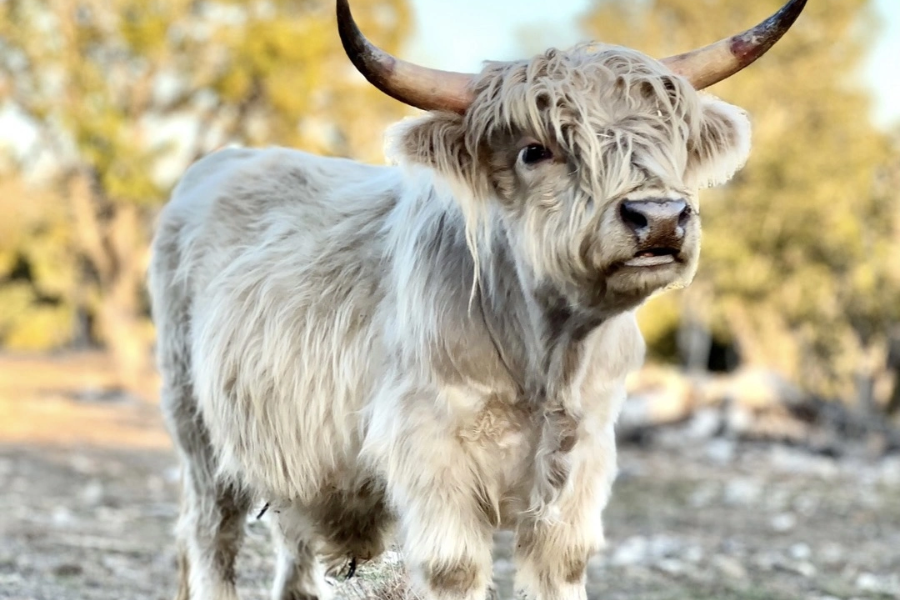In addition to their obviously adorable and fluffy appearance, the miniature Highland cow is rapidly becoming more and more well-liked worldwide due to their mild disposition, ease of care, and versatility. Small-scale farmers, hobbyists, and those seeking a unique pet could find the little Highland cow to be the ideal companion.
Everything you need to know about miniature Highland cows will be covered in this in-depth book, including their history, traits, upkeep needs, advantages, and commonly asked questions.
What Is a Miniature Highland Cow?
A miniature Highland cow is a smaller version of the traditional Highland cattle breed, originally from the rugged Scottish Highlands. Known for their long, shaggy coats, large curved horns, and docile demeanor, Highland cows have been bred down in size over generations to suit smaller farms and families.
Size:
- Height: 36–42 inches (at the shoulder)
- Weight: 500–700 pounds
- Standard Highland cows can weigh up to 1,500 pounds, making miniatures far easier to handle and house.
Origin and History of Highland Cattle
The Highland cattle breed dates back to the 6th century in Scotland. They were bred to survive harsh climates, steep terrains, and poor grazing conditions. Over time, the breed evolved to have:
- Thick double-layered coats
- Strong immune systems
- Efficient grazing habits
The miniature variant is the result of selective breeding for size while preserving the core features of the breed — resilience, friendliness, and a unique look.
Why Choose a Miniature Highland Cow?
Here’s why these pint-sized cows are gaining fans worldwide:
1. Low Maintenance
Mini Highland cows are hardy and require less space and food than standard cows. They’re great for first-time livestock owners.
2. Great Temperament
They’re docile, intelligent, and friendly, which makes them safe around kids and other animals.
3. Perfect for Small Properties
You don’t need a massive pasture. Many owners keep them on 2–5 acres and rotate grazing.
4. Natural Lawn Mowers
They help maintain land by grazing and naturally fertilizing the soil.
5. They’re Adorable
With their teddy bear-like faces, long hair, and small stature, they’ve become social media darlings and even pets in some households.
Feeding and Carefor Miniature Highland Cows
These cows are relatively easy to care for, but like all animals, they have specific needs.
Diet
- Hay or pasture: Primary food source
- Mineral blocks: To ensure proper nutrition
- Fresh water: Always available
On average, a mini Highland cow eats around 1.5–2% of its body weight daily in hay or grass.
Shelter
They don’t need elaborate barns. A three-sided shelter or lean-to is enough to protect them from harsh weather.
Grooming
- Regular brushing helps with coat maintenance.
- Their thick coat is more for insulation than show, so it doesn’t need to be trimmed unless for aesthetics or in hot climates.
Healthcare
- Annual vet check-ups
- Deworming 2–4 times per year
- Vaccinations based on local recommendations
Breeding and Lifespan
- Breeding Age: 18–24 months
- Gestation Period: ~9 months
- Calf Weight: 25–40 pounds
Miniature Highland cows can live 18 to 25 years, which is longer than most commercial cattle breeds. Their longevity and calm disposition make them a long-term farm companion.
How Much Does a Miniature Highland Cow Cost?
Prices can vary depending on the age, lineage, and size, but generally:
- Calves: $2,500 – $6,000
- Adult cows: $3,500 – $7,000+
Breeding pairs or rare color patterns (e.g., silver or white) may cost more.
Things to Consider Before Buying
Zoning & Local Laws – Some municipalities have restrictions on livestock, even miniature breeds. Always check local regulations.
Land Size & Fencing – While mini cows need less land, they still require room to graze and roam. Fencing should be secure and sturdy.
Companionship – Cows are herd animals. If you’re not able to provide a cow companion, consider a sheep, goat, or donkey for company.
Veterinary Care Access – Ensure you have access to a vet familiar with bovine care.
Where to Buy Miniature Highland Cows
Miniature Highland cows are available through:
- Registered breeders
- Miniature livestock farms
- Farm expos and cattle auctions
- Online livestock marketplaces
Always buy from a reputable breeder that can provide:
- Health records
- Vaccination history
- Breeding background
- Proof of mini genetics (not just stunted growth)
Conclusion
The miniature Highland cow is more than just a cute face — it’s a hardy, lovable, and low-maintenance animal that’s perfect for small farms, hobby ranchers, or even families looking for a unique addition to their homestead. While they do require commitment, the joy, utility, and companionship they offer make them a rewarding investment.
If you’re looking for a gentle grazer that can handle tough weather, charm everyone it meets, and fit in smaller pastures, the miniature Highland cow may just be your perfect match.
Frequently Asked Questions (FAQs)
1. Are miniature Highland cows good pets?
Yes! While they are technically livestock, many owners treat them like pets due to their gentle, friendly nature. However, they still need land, care, and proper handling.
2. Do mini Highland cows produce milk?
Yes, but not as much as dairy breeds. They’re not typically used for commercial milk production but can produce enough for small-scale or personal use.
3. How much land do I need for one mini Highland cow?
At least 1–2 acres per cow is recommended to provide adequate grazing and space.
4. Can they live in hot climates?
They prefer cooler climates due to their thick coats but can adapt to warmer areas with shade, fans, and proper care.
5. Do they get along with other animals?
Yes, mini Highland cows are generally good with other livestock and even domestic animals like dogs or donkeys when properly introduced.



